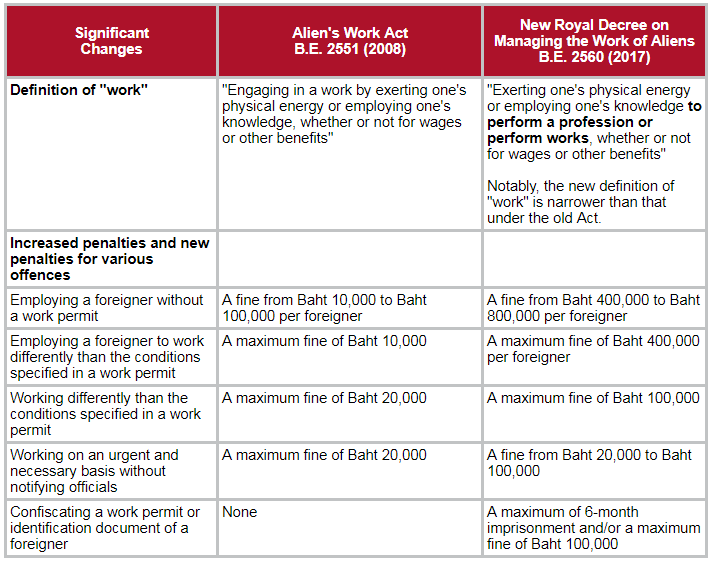10 July, 2017
On 23 June 2017, a new Royal Decree on Managing the Work of Aliens B.E. 2560 (2017) (Royal Decree) became effective. It cancels and replaces the two main pieces of legislation regulating foreigners working in Thailand, namely the Royal Decree on Bringing Alien to Work in the Kingdom B.E. 2559 (2016) and the Alien's Work Act B.E. 2551 (2008) (collectively the Previous Legislations). The Royal Decree still upholds the main requirements and principles of the two Previous Legislations but brings the provisions up to date and addresses some new issues to reflect the current situation in the country.
Citing an urgent need to address the current problems of foreigners working in Thailand as well as to tackle human trafficking issues, this new legislation interestingly was enacted in a form of a Royal Decree instead of an Act as would normally be the case. The Royal Decree seeks to address two issues previously covered under the Previous Legislations, which are: (1) foreign employees working in Thailand (e.g. work permit issues); and (2) hiring and bringing in migrant workers to work in Thailand. Examples of significant changes in the Royal Decree relating to these issues are as follows:
1. Foreign Employees Working in Thailand
Please click on the table to enlarge.
2. Hiring and bringing in migrant workers to work in Thailand
The Royal Decree largely adopts the contents of the Royal Decree on Bringing Alien to Work in the Kingdom B.E. 2559 (2016), which was only issued last year. In essence, only a Thai employer or a licensed operator can bring in migrant workers to work in Thailand. This is done by first making a request with the authority for a quota to hire a specified number of migrant workers. Once the quota is granted, the employer or licensed operator can submit a request to bring the workers into Thailand for work and, subsequently, a request for their work permits. The Royal Decree also prescribes qualifications of an operator and requirements for operating a business of recruiting migrant workers in Thailand, It also prescribes requirements to prevent human trafficking (e.g. requiring an employer to send migrant workers back to their country upon employment cessation with the employer's own money and requiring an employer to provide a security money for any debts owed or damages caused to migrant workers).
Currently, no subsequent rule or regulation has been issued under this Royal Decree. Therefore, the existing rules and regulations issued under the Previous Legislations remain valid and enforceable to the extent that they do not conflict with the Royal Decree. This includes requirements relating to applying for a work permit. For example, it is required that an employer has Baht 2 million fully-paid up registered capital per one work permit.
It should also be noted that existing work permits that were issued before the Royal Decree came into force are still legally valid until their term expires. Similarly, any application submitted under the Previous Legislations (e.g. a work permit application) before 23 June 2017 is still valid under the Royal Decree and no new application needs to be submitted.
For further information, please contact:






